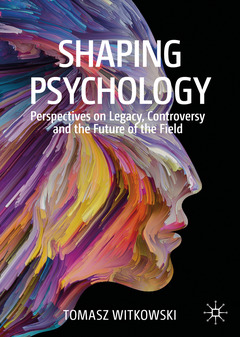Description
Shaping Psychology, 1st ed. 2020
Perspectives on Legacy, Controversy and the Future of the Field
Author: Witkowski Tomasz
Language: English
Subjects for Shaping Psychology:
Publication date: 11-2020
331 p. · 14.8x21 cm · Paperback
331 p. · 14.8x21 cm · Paperback
Description
/li>Contents
/li>Biography
/li>Comment
/li>
Shaping Psychology is a unique collection of in-depth conversations with a selection of the most influential psychologists working today, conducted at the end of a decade that shook psychological science. They provide insights into the controversies at the heart of contemporary psychology, revealing a clash of visions of what psychological science is all about and what its future holds. They are candid on the crisis in psychology and explore its causes, consequences and how to overcome it. They also discuss challenges in the field, their careers, and the experiences that shaped their worldview.
Those interviewed include pioneers who have shaped psychology as we know it today and who represent a wide range of specializations, from research to mental health practice, mainstream psychology to critical psychology and neuroscience to the Open Science movement.
Elizabeth F. Loftus, Stanford University, USA
Jerome Kagan, Harvard University, USA
Michael I. Posner, University of Oregon, USA
Scott O. Lilienfeld, Emory University, USA
Robert J. Sternberg, Cornell University, USA
Robert Plomin, King?s College London, UK
Susan J. Blackmore, University of Plymouth, UK
Joseph E. LeDoux, New York University, USA
Noam Chomsky, Massachusetts Institute of Technology, USA
Roy F. Baumeister, University of Queensland, Australia
Erica Burman, University of Manchester, UK
Brian A. Nosek, University of Virginia, USA
Vikram H. Patel, Harvard Medical School, USA
Daniel Kahneman, Princeton University, USA
Carol A. Tavris, independent academic, USA,
1. Introduction.- 2. Elizabeth F. Loftus: Cognitive Psychology, Witness Testimony and Human Memory.- 3. Jerome Kagan: Temperament, Developmental Psychology and Methodology.- 4. Michael I. Posner: Cognitive Neuroscience, Attention Networks and Training the Brain.- 5. Scott O. Lilienfeld: Clinical Psychology, Evidence-Based Treatments and Skepticism.- 6. Robert J. Sternberg: Intelligence, Love, Creativity and Wisdom.- 7. Robert Plomin: Behavioral Genetics.- 8. Susan J. Blackmore: Parapsychology, Memetics and Consciousness.- 9. Joseph E. LeDoux: Fear, Anxiety, Emotions, Consciousness and Evolution.- 10. Noam Chomsky: Psycholinguistics.- 11. Roy F. Baumeister: Self-esteem, Self-control and the Power of Will.- 12. Erica Burman: Developmental Psychology, Feminist Research and Methodology.- 13. Brian A. Nosek: Open Science and Reproducibility Projects.- 14. Vikram H. Patel: Global Mental Health.- 15. Daniel Kahneman: Decision-making, Adversarial Collaboration and Hedonic Psychology.- 16. Carol A. Tavris: Cognitive Dissonance, Gender, Feminism, and Skepticism.
Tomasz Witkowski is a psychologist, science writer, skeptic and the author of several dozen science papers, several hundred popular science articles and fourteen books. Witkowski’s previous books include Psychology Gone Wrong and Psychology Led Astray.
Presents the perspectives of leading authorities on the nature, possibilities, and limitations of psychological science
Provides an understanding of the contributions of each of the persons interviewed to their respective specialism
Offers an overview of the psychologists and the discipline as they are found in the early 21st century
© 2024 LAVOISIER S.A.S.



